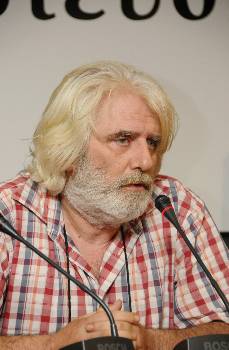Health inspectors are investigating a deficit amounting to 8.4 million euro in the Organization against drugs OKANA. It has been discovered that this deficit was mainly due to the transfer of funds from therapeutic programmes to salaries. In the period 2003-2010, salaries in the Organization increased by between 60% and 182%. The situation with the payment of excessive bonuses was similar.
These numbers became apparent from the four reports of examiners ordered by chief auditor of public administration Leandros Rakindzis.

Leandros Rakindzis
According to him, the black hole in the Organization’s finances was due to the fact that from 2010 to the end of 2012 salary costs at OKANA remained high (exceeding revenues by 60%) since they did not comply with the requirements of the uniform payroll table, while the state subsidy was reduced by up to 40%.
According to sources, health inspectors have found that the deficit of 8.4 million euro was mainly due to the transfer of funds from various programmes to the item "salaries" of the Organization.
The first four reports on the subject were published in January 2011 and presented at a joint press conference by Leandros Rakindzis and the then Director of the Organization Meni Maliori. At the time, the chief auditor had sent reports to the Prosecutor's Office with a request that charges for mismanagement should be pressed against previous managements of OKANA.
A year later, he asked the General Accounting Directorate to check reports of the Organization for paid salaries and the inspection again found that the payment of excessive bonuses without the application of the uniform payroll table has continued.
In particular, inspectors have found that:
From 1998 to 2011, the allowance for hazardous work increased by up to 576%.
In March 2011, employees working on the street, received an allowance of between 85 and 392 euro while at the same time this allowance amounted to 70 euro in the public sector, and 150 euro for cleaning workers in the local administration.
Cleaners also received this allowance, as well as ushers of the Organization against drugs.
In 1998, the family allowance (for marriage and children) amounted to 35 euro, but in 2011, it increased to 708 euro for a family of four children, marking an increase of up to 570% for medical staff. At the same time, the uniform payroll table in the public sector only provides for child allowances to the amount of 35 euro for one child, 70 euro for two children, 120 euro for three children and 170 euro for families with four children.
The collective agreement also foresaw an increase in hospital benefits in the period 1998-2011, which reached 502% for non-medical personnel (from 58 euro, the allowance increased to 353 euro).
Even the allowance for working on a computer amounted to 204 euro for an employee with higher education, while, according to the law, this allowance should be 97 euro.
The General Accounting Directorate requested that salaries should comply with the provisions of laws that relate to salaries in the public sector and requested the return of amounts that have been unduly paid to workers.
At a meeting on 25 July 2012, the Management Board of the Organization against drugs rejected the audit report of the General Accounting Directorate in the part of the return of paid amounts.
Since the beginning of 2013, cuts in salaries of the 650 employees in the organization have started, according to the provisions of the uniform payroll table.
A conflict between workers and the chief auditor
Workers at the Organization against drugs came into conflict with chief auditor of public administration Rakindzis and accused him of lying about the increase of salaries by up to 182%, as well as about remunerations amounting to up to 2,500 – 3,000 euro, indicating that the average salary for the 650 employees has not exceeded 1,300 euro in the last three years.

Leandros Rakindzis ordered new control over the management of the Organization against drugs, which is being carried out these days by health inspectors and will be completed by the end of the year. Moreover, in a statement, he said that despite the remarks of the General Accounting Directorate, a law legalizing bonuses was voted in July 2013.
For Ethnos newspaper, he noted that such legislative initiatives negate the results achieved by inspection bodies and enabled them to continue paying the amounts.
President of the Syndicate of Workers at the Organization against drugs Yiannis Kaklamanis told Ethnos that employees in the organization wanted the inspection to finish so that the discussing of OKANA’s deficit could finally stop.
"During the management of Meni Maliori, the remuneration of employees was reduced by 50%, the funding of the organization was reduced by 40%, while the number of serviced people has doubled from 4,000 to 8,200", noted Kaklamanis.
He also wants the chief auditor to drop the charges and stop with "the lies and inaccuracies in terms of OKANA". At the same time, the President of the Syndicate of Workers at the Organization against drugs urged Rakindzis to check the payroll system.